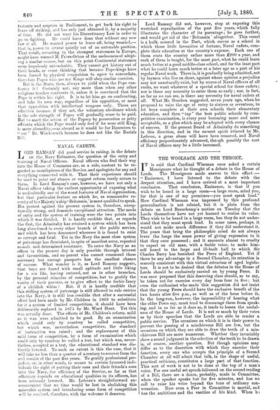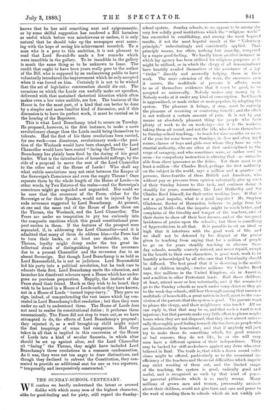THE WOOLSACK AND THE THRONE.
IT is said that Cardinal Wiseman once asked a certain Monsignore what he thought of a debate in the House of Lords. The Monsignor° made answer to this effect :—
" Eminence, I have listened to the debate with the deepest attention, and I have arrived at a most important conclusion. That conclusion, Eminence, is that if you
wish to be heard in a large room—a large room, mind you, for that is one of my premisses—yon must speak loud." How Cardinal Wiseman was impressed by this profound generalisation is not related, but it is plain from the debate on Lord Beauchamp's motion on Tuesday that the Lords themselves have not yet learned to realise its value. They wish to be heard in a large room, but they do not under- stand that they must speak loud. In some cases, perhaps, it would not make much difference if they did understand it. The years that bring the philosophic mind do not always lesve the lungs the same power of giving expression to it that they once possessed ; and it amounts almost to cruelty to expect an old man, with a feeble voice, to make him- self heard in the large and ill-built hall to which Sir Charles Barry has banished the Peers of England. Yet if there be any advantage in a Second Chamber, its retention is scarcely consistent with this virtual ostracism of aged legisla- tors. It is not to be desired that the debates in the House of Lords should be exclusively carried on by young Peers. It was once proposed that this deserving class should, so to say, be taken out for exercise every day from four to five ; but even the enthusiast who made this suggestion did not insist that the young Peers should have the exclusive benefit of the two hours after five p.m., as well as of the hour before it. In the long-run, however, the impossibility of hearing what the older Peers say, must tend to discourage them from speak- ing, and in so far as it does so, it tends to lessen the useful- ness of the House of Lords. It is not so much by their votes as by their speeches that the Lords are able to render a public service. The occasions on which it is in their power to prevent the passing of a mischievous Bill are few, but the occasions on which they are able to draw the teeth of a mis- chievous Bill are more numerous. Whether they invariably show a sound judgment in the selection of the teeth to be drawn is, of course, another question. But though opinions may differ as to the discretion with which they exercise their function, every one who accepts the principle of a Second. Chamber at all will admit that talk, in the shape of useful, practical criticism, constitutes a large part of that function. This sort of work is not to be done at the top of a man's voice. For one useful set speech delivered on the second reading of a Bill, there are a dozen, probably, made in Committee, when the speaker speaks but for five minutes, and has no call to raise his voice beyond the tone of ordinary con- versation. Now even a Peer in Committee is mortal, and has the ambitions and the vanities of his kind. When h3
knows that he has said something neat and epigrammatic, or by some skilful suggestion has rendered a Bill harmless or useful which before was mischievous or useless, it is only natural that he should take up the newspaper next morn- ing with the hope of seeing his achievement recorded. To a man who is a prey to this ambition, it is not pleasant to read that Lord So-and-So made a few remarks which were inaudible in the gallery. To be inaudible in the gallery is much the same thing as to be unknown to fame. The credit that ought to have been yours really goes to the author of the Bill, who is supposed by an undiscerning public to have voluntarily introduced the improvement which he only accepted when it was forced on him. Certainly it is not to be wished that the art of legillative conversation should die out. The occasions on which the Lords can usefully make set speeches, delivered with that sustained rhetorical intention which often makes even a low voice audible, are few. The business of the House is, for the most part, of a kind that can better be done by a simpler and more familiar kind of discussion, and if this discussion is to have its perfect work, it must be carried on in the hearing of the Reporters.
This is what Lord Beauchamp tried to secure on Tuesday. He proposed, however, in the first instance, to make a more revolutionary change than the Lords could bring themselves to tolerate. Had the first of his three resolutions been carried, for one week—one disastrous, revolutionary week—the posi- tion of the Woolsack would have been changed, and the Lord Chancellor would have been seated "facing the Throne." Lord Beauchamp has plainly been fired by the daring of his great leader. What is the introduction of household suffrage, by the side of a proposal to move the seat of the Lord Chancellor to the other end of the House of Lords ? Who shall say what subtle associations may not exist between the Keeper of the Sovereign's Conscience and even the empty Throne ? Once separate them by the whole length of the House of Lords—in other words, by Two Estates of the realm—and the Sovereign's conscience might go unguided and unguarded. Nor could we be sure that the reverence of the Peers, either for the Sovereign or for their Speaker, would not be injured by the rude severance suggested by Lord Beauchamp. At present, at one and the same end of the House of Lords there are the Throne, the Woolsack, and the Lord Chancellor. The Peers are under no temptation to pry too curiously into the composite emotions which this grand constitutional pros- pect excites in them. If the features of the prospect were separated, if, in addressing the Lord Chancellor—and it is admitted that many of them do address him—the Peers had to turn their backs, or at least one shoulder, on the Throne, loyalty might droop under the too great in- tellectual strain of distinguishing between the reverence due to a present Chancellor and the reverence due to an absent Sovereign. But though Lord Beauchamp is as bold as Lord Beaconsfield, he is not as judicious. Lord Beaconsfield led his party into a political revolution, but he took care to educate them first. Lord Beauchamp omits the education, and launches his dissolvent schemes upon a House which has under- gone no previous preparation. Happily, the instinct of the Peers stood their friend. Much as they wish to be heard, they wish to be heard in a House of Lords such as they have known, not in a House of Lords "turned topsy-turvy." They gave no sign, indeed, of comprehending the vast issues which lay con- cealed in Lord Beauchamp's first resolution ; but then they were under no call to understand them. The House of Lords does not need to realise its constitutional duties ; it performs them unconsciously. The Peers did not stop to trace out., as we have attempted to do, the effects of Lord Beauchamp's proposal ; they rejected it, as a well brought-up child might reject the first temptings of some bad companion. Had they taken in all that is implied in this conversion of the House of Lords into a kind of secular Samaria, in which altar should be set up against altar, and the Lord Chancellor
sit "facing" the Throne, they might have included Lord Beauchamp's three resolutions in a common condemnation. As it was, they were not too angry to draw distinctions, and though they declined to subvert the Constitution, they con- sented to provide an additional seat for one or two reporters, "temporarily and inexpensively constructed."



































 Previous page
Previous page